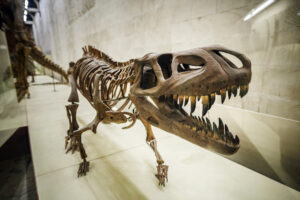Visitors to the Brandenburg Gate will notice that the Berlin landmark has been transformed into a giant soccer goal, measuring 64 x 26 meters, making it the largest football goal in the world.
In addition, 24,000 square meters of artificial turf have been laid between the Brandenburg Gate and the Victory Column, the so-called fan zone.
The reason for the huge effort is the 2024 European Football Championship (UEFA EURO 2024 for short), which will take place in Germany from June 14 to July 14. For the first time since reunification, Europe’s biggest and most important football tournament will be held in Germany.
In addition to German football fans, around 2 million visitors from 120 countries are expected.
The 51 UEFA EURO 2024 matches will be played in ten stadiums in ten German cities, of which the Olympiastadion in Berlin is the largest and oldest with 74,475 seats.
Although you can watch all the matches from the comfort of your sofa on public television, real football fans will tell you that a live broadcast cannot compare to the experience of being in the stadium. The noise, atmosphere, and passion that accompanies a soccer game in the stadium cause thousands to leave the comfort of their couches and dig deep into their pockets to watch the game from the stands. Many soccer fans also come to the stadium to mentally and vocally support their country’s team.
But what does the halacha say about going to a stadium and cheering for your country’s team?
The Talmud (Tractate Avoda Zara 18b) says that attending an “izdaiyon” is forbidden because of “Moschav Leizim”. The first verse of Psalms is cited as the source: “Blessed is the man who does not walk in the way of the wicked, who does not persevere in the way of sinners, who does not sit in the circle of mockers…”.
The Talmud concludes from this Psalm that there are places where scoffers gather, people who are unproductive and waste their time, and that it is not appropriate for a God-fearing and spiritually growing person to spend time there.
But what is the “Iztadiyon”? The medieval Talmud commentator Rashi (Rabbi Schlomo Izchaki, 1040-1105) interprets it as a place where bull and gladiator fights are held, obviously referring to the Roman Colosseum.
Would the sages of the Talmud also forbid a visit to a modern sports stadium?
Although a modern sports stadium is also called “Iztadiyon” (אצטדיון) in modern Hebrew, it has little in common with the gruesome spectacles that entertained the bloodthirsty patrons of the ancient Colosseum. Even the avoda zara (idolatry) that was an integral part of the Colosseum’s programming and atmosphere is absent today (although the idolization of soccer stars sometimes borders on idolatry).
Nevertheless, Rabbi Moshe Feinstein (1895-1986), American rabbi and one of the most important halachic authorities of the 20th century, writes in his responsa (Iggrot Moshe, Yoreh Deah Vol. 4, 11) that despite the fundamental differences between the Colosseum and a modern stadium, the Talmud’s reason for prohibiting the Colosseum, “Moshav Leizim,” also applies to our sports stadiums. Rabbi Menasche Klein (1924-2011), another American rabbi, shared this view and forbade attending a sporting event in a stadium (Mishneh Halachot vol. 6, 270).
However, it is also argued that unlike the Colosseum, which was also forbidden due to avoda zara, there is no categorical prohibition against attending a stadium today:
Rabbi Chaim Pinchas Scheinberg (1910-2012) explains that the prohibition of “Moshav Leizim” must be seen in the overall context of the first Psalm, the second half of which reads, “[…] But his delight is the Torah of G-d, and with his Torah he occupies himself day and night. He interprets the Talmudic prohibition of “moshav leizim” not as a prohibition per se, but as a catalyst for the inability to devote oneself to and concentrate on the study of Torah. Accordingly, there is no halachic problem for a person who is able not to get too carried away by the passion in the stadium and continues to devote himself to Torah study and spiritual obligations to attend a stadium.
Thus, the halachic legitimacy of going to a stadium is a matter of opinion among the halachic authorities (and it seems to me that the opinion of Rabbi Chaim Pinchas Scheinberg has prevailed).
If you don’t want to go to the stadium, but still want to experience the atmosphere and the passion, Public Viewing in the Fan Zone at the “Brandenburg Gate” is just the thing for you. And an important disclaimer for all those who care about the environment and sustainability: The 24,000 square meters of artificial turf in the Fan Zone will be reused for soccer pitches in Berlin after UEFA EURO 2024.




